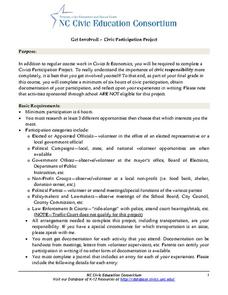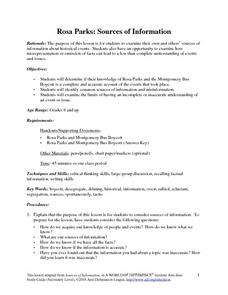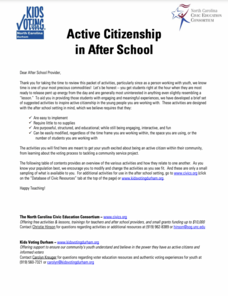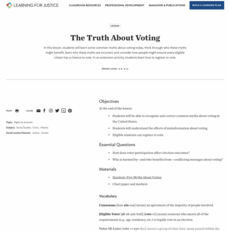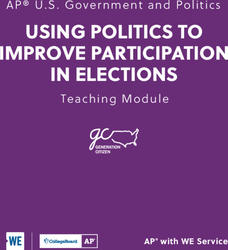Curated OER
Martin Luther King Jr. and Nonviolence
Using the book, Martin's Big Words, learners will discover the life of Dr. Martin Luther King Jr. Vocabulary is identified throughout the story by using several his famous protest speeches as examples. Class discussions on racism, during...
Carolina K-12
Get Involved! - Civic Participation Project
What better way to learn about civic responsibility's importance than to experience it? From the opportunity to volunteer in an elected official's office and participate in a political campaign to observations of school board and city...
Carolina K-12
Compulsory Voting
Should voting in the United States be compulsory? In 2004, fewer than 60 percent of eligible voters cast ballots in the American national elections. After reviewing arguments for and against compulsory voting, your young citizens will...
Anti-Defamation League
Rosa Parks: Sources of Information
Young scholars show what they know about Rosa Parks and the incident on one of the buses in Montgomery, Alabama. Groups discuss and identify where they receive most of their information. They examine the importance of having a complete...
Carolina K-12
Active Citizenship in After School
Active citizenship is the bedrock of any great democracy. Continue the trend by teaching the next generation about voting rights and the functions of elections in society. The variety of activities in the resource includes a human...
Facing History and Ourselves
Many Voices, One National Identity
To conclude the unit on "Exploring Identity in the United States," pupils consider whether it is possible to combine many voices into one national identity. After creating an identity chart that lists words, phrases, and images that they...
Franklin D. Roosevelt Presidential Library & Museum
Civic Holiday Work Sheets
Everyone loves a day off, be it a national or statutory holiday or a civic holiday. The final resource in a 10-part civics series features 14 worksheets of the type given to young visitors at the Franklin D. Roosevelt Library and Museum....
Franklin D. Roosevelt Presidential Library & Museum
Role Playing Relating to Big Decisions
While most high schoolers are too young to vote, they still need to learn the skills needed to solve problems. The ninth resource in a 10-part civics series presents class members with four "What Would You Do?" scenarios that have them...
Franklin D. Roosevelt Presidential Library & Museum
Voting and Participation in Decision Making
"If you don't vote - you don't count." That's the big idea in this resource about voting and participation in the democratic process. The three included activities focus students on being informed voters, practicing voting for their...
Franklin D. Roosevelt Presidential Library & Museum
What Does It Mean to be a Good Citizen?
Civics scholars are challenged to determine what it means to be a good citizen. Class members select three adults in their lives and interview them to discover what the term "good citizen" means to each of these people. The class then...
Franklin D. Roosevelt Presidential Library & Museum
Practice Passing Laws
Getting a bill through the legislative process to become a law in the United States is a very long and difficult procedure by design! To understand the deliberation, debate, and compromises involved, class members take on the role of...
Franklin D. Roosevelt Presidential Library & Museum
The Power of Propaganda in Shaping Civic Actions and Understanding
Propaganda posters are powerful. Using images from The Art of War: American Poster Art 1941-1945 exhibit, young historians analyze the symbols, images, colors, and text used to rally support for World War II. Through seven activities,...
Franklin D. Roosevelt Presidential Library & Museum
Service Learning Projects
Service learning projects provide pupils an opportunity to put the theories they are learning about civics into practice. Scholars investigate the needs of their community and then adopt a project for them to become involved in.
Franklin D. Roosevelt Presidential Library & Museum
The Constitution
Three activities focus on the need to have rules. Young historians are first challenged to suggest rules for their classroom and then to create their own constitution that balances the need for freedoms and protections. The third...
Franklin D. Roosevelt Presidential Library & Museum
What Does It Mean to Be an American?
A series of four activities focuses young scholars' attention on what it means to be an American. They identify key qualities, values, and virtues they consider shared by Americans. Participants then pretend they have been selected to...
Newseum
The First Amendment in Action Today
Young activists research a community issue and apply the rights defined in the First Amendment to develop a proposal that would solve the issue—using Pinterest's board "The Freedom to Make A Change Posters" as examples, groups design a...
DocsTeach
Martin Luther King, Jr. and the Fight for Civil Rights
Find clues to the past with photos! Young historians use a photo from one of Martin Luther King Jr.'s peaceful protests to practice photo analysis. Academics look at the image to gain clues about what is happening and why. To finish,...
DocsTeach
Analyzing a Letter About American Indian Voting Rights
An informative activity focuses on the law preventing Native Americans from voting until 1947. Scholars read documents from the Office of Indian Affairs, complete an online worksheet, and participate in group discussion. Academics learn...
DocsTeach
WWI Propaganda and Art
Uncle Sam wants you! During World War II, the US government and military created a propaganda campaign to gain public support. The activity uses primary documents such as photos to explain how and why the propaganda campaign was...
iCivics
iCivics Backyard Adventure
Imagine arguing a real Supreme Court case! Running your own county government! Acting as President for a day! iCivics offers games, web scavenger hunts, and other activities that encourage summer scholars to learn about their communities...
Teaching Tolerance
The True History of Voting Rights
Explore what voting rights really are in an intriguing activity that explores the history of American voting. The resource examines the timeline of voting rights in the United States with group discussions, hands-on-activities, and...
Teaching Tolerance
The Truth About Voting
True or False: Only Presidential elections matter. Academics delve into common voting myths to understand what is true and why the election process is critical to democracy. The lesson uses group discussion, activities, and handouts to...
Teaching Tolerance
Why Local Elections Matter
Uncle Sam wants everyone to vote in local elections! Geared toward middle and high school scholars, the resource explores voter turnout and the importance of local elections. Academics participate in group discussion, complete...
College Board
Using Politics to Improve Participation in Elections
Instructors new to teaching AP U.S. Government and Politics classes, as well as seasoned veterans, will find this teaching guide an invaluable resource. Using a project-based approach to civics education, the lessons emphasize real-world...



